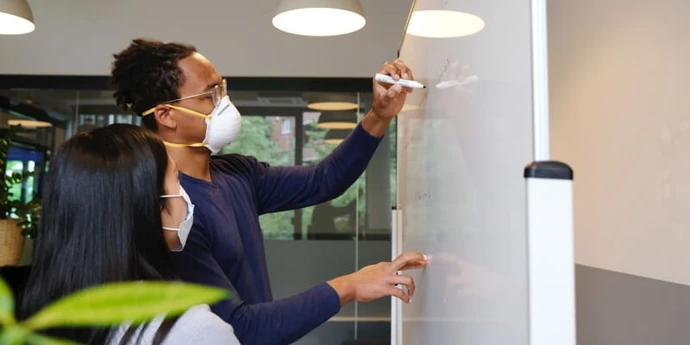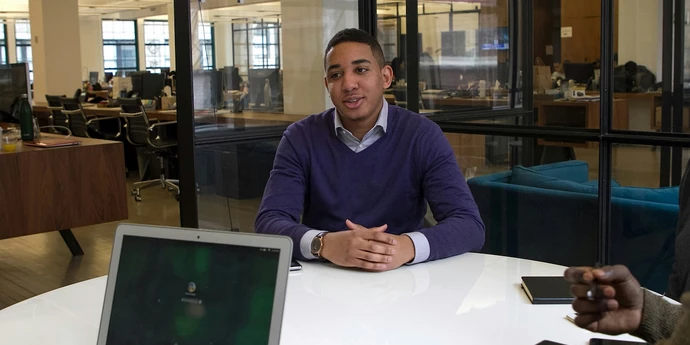“Tell me about a time you showed leadership” is an extremely common interview question, even if you’re not applying for a leadership position.
In this guide, we explain why interviewers ask this question and what you need to keep in mind as a candidate.
We’ll look at five different answer examples and we’ll explain how exactly you should prepare for this and other common interview questions.
- How to answer "Tell me about a time you showed leadership"
- Common pitfalls
- Five example answers to "Tell me about a time you showed leadership"
- Practice answering "Tell me about a time you showed leadership"
Here’s one thing you should know right away: you can use a framework that's better than STAR.
Click here to practice common interview questions 1-on-1 with ex-interviewers
How to answer “Tell me about a time you showed leadership”
Okay, let’s see what interviewers are looking for and what you need to know in order to ace this question. We’ve distilled all of it into three key points. Read and absorb them, and then we’ll show you some example answers.
#1 Everyone can be a leader
Interviewers will test for leadership skills in every candidate, no matter how junior, because leadership is relevant for all roles.
A junior software engineer, for example, won’t know how to lead a team of engineers. But there may be an occasion where they can lead a process, or lead a meeting, and doing this well has an impact on the wider team.
Furthermore, interviewers want to hire people that can grow into leaders, even if they aren’t yet.
So, don’t worry you’ve never held a leadership position before. Your answer can come from a situation in which you weren’t named as a leader but demonstrated leadership nevertheless.
Do you have an example from work where you stepped up and took responsibility for a project, convinced team members on an important decision, or stepped in to solve a conflict? These would all work as leadership examples.
#2 Adapt your answer to the company
Interviewers are not only testing you to see if you have the soft skills necessary for leadership. They also want to know if your style of leadership fits with their company’s ethos. Therefore, try to align yourself with the culture and leadership principles of the company you’re interviewing with.
That’s not to say that you should lie about your leadership style. But you should consider which leadership skills you should highlight depending on the company.
Let’s imagine you’re applying for a job in tech. At Meta / Facebook, self-awareness and empathy in leaders is very highly valued, so you would make sure your answer demonstrates these values. Meanwhile at Amazon, “having backbone: disagree and commit” is one of the key leadership principles, so you might want to give an answer that shows you’re brave enough to challenge decisions you don’t agree with.
Go to the company’s website (or even better, talk to someone who works there), take note of the leadership values they most focus on, and craft your answer accordingly.
#3 Structure your answer
“Tell me about a time you showed leadership” is a behavioral interview question. Behavioral questions are when the interviewer asks you about past experiences in order to assess whether you display the kind of behaviors they’re looking for.
Using an answer framework will help you structure your answers to behavioral questions. You’ll see that our leadership example answers below follow the SPSIL framework:
- Situation
- Problem
- Solution
- Impact
- Lessons
We recommend you use the SPSIL framework, as we believe it’s better than the more commonly-used STAR framework.
If you want to see why SPSIL is better, see our complete guide to behavioral interview questions.
Common Pitfalls
There are some very common pitfalls when answering "Tell me about a time you showed leadership", so make sure you avoid them.
#1 Leadership is more than a title
Some candidates with relevant leadership experience on their resume will just point to one of those examples, e.g: “I was lead engineer on a team of six at my previous company”.
That’s a lazy answer. The interviewer already knows from your resume that you were given a leadership role - they want to hear about how superbly you did it and specific actions you took.
#2 Don’t use an example from a long time ago
For some answers, such as “Tell me about a time you failed”, it’s fine to use an example from several years ago.
However, if you do this for a leadership question, it suggests to the interviewer that for the last few years you haven’t displayed any leadership capacities. Try to use an example that’s from within the last two years.
#3 Don’t sound arrogant
You should be the hero of your answer, but take care to remain humble in the way you talk about yourself and be respectful of the other people involved in your stories. You might think you’re a natural born leader, but saying that sort of thing out loud conveys arrogance and a lack of self-awareness.
5 example answers to “Tell me about a time you showed leadership”
With the points we’ve covered above, you should be ready to start preparing your answer.
So you can see what to aim for, we’ve created five strong example answers.
You’ll see that we’ve tweaked the question slightly in some of the answers. There are a few common variants of the “Tell me about a time you showed leadership” question, and you should be ready for any of them
#1 “Tell me about a time you showed leadership: junior/mid-level candidate
Example answer:
(Situation)
“As a level 3 SWE at a small start-up, I faced a critical project where our database infrastructure encountered unexpected scalability issues.
(Problem)
The project involved migrating a large customer dataset, and the technical challenges threatened the project's timely completion. To make matters worse, our engineering manager was away on holiday and there was no other senior figure at the company with a technical background.
(Solution)
I was the most experienced member of our team and so felt that I should take the lead to rectify the situation, although I was a bit nervous as I’d never led a team before. I got the team together and assigned specific tasks to each of my colleagues based on their expertise.
As we worked to introduce improvements, I checked in regularly with the company CEO and outlined the revised timeline based on the revised optimization plan.
(Impact)
Everyone worked really efficiently and we successfully resolved the scalability issues within the project timeline. The migration was completed seamlessly, and the system performance improved significantly.
(Lessons)
This project gave me a lot of confidence in my ability to lead people and projects. I also realized important soft skills are - I love coding but on this project, I found that communication and organizational skills were much more important. I’ve since made an effort to develop these skills instead of just focusing on my technical abilities.”
This is a strong answer for a candidate who has relevant work experience but has never held a leadership position. The answer demonstrates initiative and strong communication skills.
#2 “Tell me about a time you led a team through a difficult situation”: experienced candidate
Example answer:
(Situation)
"I spent three years working at a small start up, and after an initial period of rapid growth, revenue dropped off and we started losing money.
(Problem)
I was leading a team of five, and understandably people were extremely worried about their jobs. I also had pressure from the CEO to implement cost-cutting and revenue-generating measures that would help us get back to break-even as soon as possible.
(Solution)
My primary focus was on keeping the team motivated and productive, even in the face of uncertainty. My first action was to schedule a meeting to specifically discuss the situation and provide an honest and transparent overview of what was happening.
I acknowledged the challenges that the company was facing, but that our team was essential to the company's success. I said that if they had any questions they could always ask me. We also came up with a list of team actions we could take that would reduce costs, and over the next 6 months I arranged bi-weekly updates with the CEO to show how we were progressing.
(Impact)
Through these actions my team played a major part in getting the company back on track, and I made sure this was visible to the CEO. There were no lay-offs in our area and morale and productivity stayed strong.
(Lessons)
It was a difficult experience to go through but I learned that when you’re managing a team, constant communication is vital in a crisis. People always have doubts and hypothetical scenarios you hadn't even thought of, and it’s really useful to provide a space where you can listen to them, show empathy and give them a more accurate picture of what’s going on, even if that picture is incomplete.”
The candidate demonstrates key leadership skills such as empathy, honesty, respect, ownership and calmness under pressure. They demonstrate that they are a leader who takes steps to look after their team and are present and available in a crisis.
#3 “Tell me about a time you showed leadership”: junior/mid-level candidate
Example answer:
(Situation)
“In my last position, I was on a team of analysts working on a live deal to try to bring on a new client. We hadn’t worked with them before, and it was a big name, so this was a huge opportunity for the company.
(Problem)
One day before a key meeting with the potential client, the associate taking the lead on the deal got sick. As her symptoms developed, it became clear that she would not be able to attend the meeting and pitch our services to the new client. We had to decide whether to try to reschedule the meeting, or to go ahead without her leadership.
(Solution)
I knew that rescheduling the meeting at the last minute would make us appear unreliable to the potential client, so I called the other analysts and persuaded them that we should maintain the meeting and that I could give the pitch. They agreed, and we rehearsed the pitch together that evening.
The next day, I gave the pitch and was able to answer the potential client’s questions, with help from the other analysts. I was able to remember most of what we prepared with the associate, and my teammates were able to support me in the other areas.
(Impact)
The client asked for extra time to consider the deal, but did ultimately come back to us and accept. They are now one of our regular clients, and through that relationship alone we’ve brought in a little over $200,000 in revenue for the company.
(Lessons)
So I learned how important it is to prepare in advance for all eventualities. Had we set up a contingency plan prior to the pitch, the associate’s illness would not have created such last-minute stress leading up to the meeting. So now I work to stay aware of needs outside of my job description, and to anticipate risks ahead of time.”
Here the candidate uses an example where they stepped up to be a leader. The answer demonstrates a great deal of ownership and initiative. It also suggests the candidate has good persuasion skills, which an interviewer might want to follow up on.
#4 “Tell me about a time you showed leadership skills”: fresher candidate
Example answer:
(Situation and problem)
I’m a keen basketball player but at the university I went to in the UK, there were no basketball teams. So I decided to take the initiative and start a basketball league on campus.
(Problem)
My goal was to get at least 6 teams and have regular, competitive games each week, plus social events so people could make new friends and feel part of a community.
(Solution)
At first I did everything myself - spread the word around campus to get sign ups, got payments and booked the pitches, and ran a “join a team” trials event. Within weeks the league was up and running with 10 teams, which was fantastic.
However, it was taking a lot of my time and so I needed to start delegating. I asked for volunteers to fill the roles of social secretary, treasurer, etc. That took some load off me and was also beneficial in that they brought in some great skills that I didn’t have.
(Impact)
The league and everything that went with it became my most treasured university experience, despite my team finishing last. Three years later, it’s still running and a total of almost 1000 students have taken part in the games and social events.
(Lessons)
This experience taught me that with a bit of initiative, you can make big things happen. Also, being in charge of something that involved so many people gave me a lot more confidence in other aspects of my life and work.
Finally, it also taught me how important it is as a leader to know how to delegate, not only to give yourself more time, but so you can benefit from other people’s skills and perspectives."
This is a great leadership example from someone without much professional work experience. Their example shows a lot of initiative and drive, as well as organizational skills and the ability to delegate.
#5 “Tell me about a time you demonstrated leadership”: junior candidate
Example answer:
(Situation)
Recently in my current role as an intern, Mo, joined our team. I had a very high workload at the time and so was grateful to see an extra pair of hands join the team.
(Problem)
However, Mo lacked experience in some of the key tools we used daily, such as GitHub and Django. He was also very shy. After the first week, he hadn’t completed many of the tasks he was given and people stopped asking for his help. Our manager was so busy that he didn’t really pay much attention to the situation.
(Solution)
I decided to sit with Mo at lunch and ask him about his experience with coding. I gradually realized that while he’d never worked in a team like ours before, he was a talented programmer. I told him what I was working on and he seemed confident he could help.
I delegated some of my tasks to Mo over the next couple of days, making it clear that if he didn’t understand something, he should just ask. He completed the tasks very well. By now he came to sit with me every lunchtime and was starting to come out of his shell. I used the time he’d saved me to show him some things on GitHub and Django, and I made sure I told everyone about the great job he’d done for me.
(Impact)
The rest of the team started sending him tasks again and this time Mo completed the tasks much more successfully, occasionally asking me for help. Three months later, his internship ended and he joined the team full-time.
(Lessons)
The experience with Mo made me realize that when somebody joins a team, it’s really important that they have someone to go to when they don’t understand something or have a problem. It also taught me how crucial it is to take the time to ask and listen, instead of dismissing people after a bad first impression.”
This candidate demonstrates various leadership skills with this example: in particular a lot of initiative and empathy. The interviewer could easily imagine this candidate as a future manager who will do a great job helping his team members reach their potential.
Practice answering “Tell me about a time you showed leadership”
We've coached more than 15,000 people for interviews since 2018. There are essentially three activities you can do to practice for interviews. Here’s what we've learned about each of them.
Practice by yourself
The information above should have you well on the way to crafting a great answer to “Tell me about a time you showed leadership”. You should be able to tell your story naturally, neither missing key details nor memorizing them word-for-word. Do the same for the other common behavioral interview questions.
Of course, by yourself you can’t simulate thinking on your feet or the pressure of performing in front of a stranger. Plus, there are no unexpected follow-up questions and no feedback.
That’s why many candidates try to practice with friends or peers.
Practice with peers
If you have friends or peers who can do mock interviews with you, that's an option worth trying. It’s free, but be warned, you may come up against the following problems:
- It’s hard to know if the feedback you get is accurate
- They’re unlikely to have insider knowledge of interviews at your target company
- On peer platforms, people often waste your time by not showing up
For those reasons, many candidates skip peer mock interviews and go straight to mock interviews with an expert.
Practice with experienced interviewers
In our experience, practicing real interviews with experts who can give you company-specific feedback makes a huge difference.
Find an interview coach so you can:
- Test yourself under real interview conditions
- Get accurate feedback from a real expert
- Build your confidence
- Get company-specific insights
- Learn how to tell the right stories, better.
- Save time by focusing your preparation
Landing a job at a big tech company often results in a $50,000 per year or more increase in total compensation. In our experience, three or four coaching sessions worth ~$500 make a significant difference in your ability to land the job. That’s an ROI of 100x!
Click here to book behavioral mock interviews with experienced interviewers















